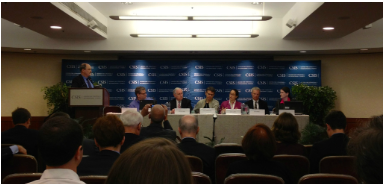FairWinds Partners — May 24, 2013
The Center for Strategic and International Studies and the Washington DC Chapter of the Internet Society recently co-hosted a panel discussion on the dicey topic of “The Geopolitics of Internet Governance.”

Panelists addressed the questions of how to devise a more inclusive Internet Governance structure to replace the U.S.-centric one developed in the 1990s. The trick will be how to satisfy non-western states’ desire for a larger role and still maintain essential democratic principles such as the free flow of information and human rights.
The panel featured:
- Phil Verveer, Former US Coordinator, International Communications and Information Policy, US Department of State
- Veni Markovski, ICANN, Vice President for Russia, CIS and Eastern Europe
- Jane Coffin, Director, Development Strategy, The Internet Society
- Bill Smith, Senior Policy Advisor, Technology Evangelist, PayPal
- Laura DeNardis, Associate Professor in the School of Communication, American University
Phil Verveer said that since the multi-stakeholder process creates inherent challenges, we need a better definition of “multi-stakeholder” to determine who participates and in what way. Among the considerations, he said, are that the U.S. created the Internet; the economic, social, political, and cultural influences the Internet has on the world; the dominance of U.S. sensibilities about content, which are not universally shared; and the threat of cybersecurity and the uncertainty of how to address it.
Veni Markovski, who lived in Bulgaria for 28 years, praised that country’s approach to the Internet. Hundreds of Internet providers are available to Bulgarians. And when the government tried to take control, the people sued and won. Markovski said education and development are key in the geopolitics of Internet governance. Different countries view the Internet in different ways, he said, and they all have different views of what it entails.
Jane Coffin agreed that education is essential to effective participation in Internet governance, noting that discussion is difficult when some languages, Russian, for example, don’t have a word for or an understanding of the concept of “multi-stakeholder.” Coffin felt strongly that the United Nations’ International Telecommunication Union (ITU) must play a role. She urged that the debate be broadened to include and listen to developing countries around the world.
Bill Smith observed that the agenda for almost every meeting on Internet governance over the past few years has been based on the Tunis agenda, and since the ITU is the only group mentioned in the agenda, it has tried to assert itself as the intergovernmental agency charged with defining Internet governance. Smith was critical of the ITU, doubting its ability to address important governance issues such as cybersecurity, spam, use and misuse of the Internet, privacy and personal data, and protection from abuse and exploitation.
Laura DeNardis observed that Internet governance debates can be “proxies” for debates over economic and political power, in part because it is entangled with national security, given its role in modern warfare. DeNardis described the complexity of Internet governance as a mosaic: complicated beyond the management abilities of any one entity.
Internet Corporation for Assigned Names and Numbers (ICANN) and the New gTLD Program issues were not raised until the Q&A session and, even then, were only touched upon lightly.
DeNardis said there is no technical need for new gTLDs and that they will create problems for trademark holders. On the other hand, she said businesses will find advantages in a larger domain name space and new possibilities for marketing innovations.
Markovski defended ICANN against a complaint that the New gTLD Program was implemented without diverse input, arguing that many governments around the globe participated via the Governmental Advisory Committee (GAC). Jamie Hedlund, VP, Stakeholder Engagement – North America, for ICANN – was in the audience. He said ICANN is the only multi-stakeholder institution with a role for governments and that 124 governments are members of the GAC. He said ICANN believes the GAC was highly effective and influential in shaping the New gTLD Program.
Hedlund emphasized that the GAC Communiqué, drafted at the ICANN 46 meeting in Beijing, will be taken seriously by the ICANN board. ICANN’s credibility hinges on the effective contributions of governments, he said, echoing GAC Chair Heather Dryden’s comments in her recent video interview.
In Policy Updates CSIS, GAC Advice, ICANN, Internet Governance, ISOC, New gTLDs